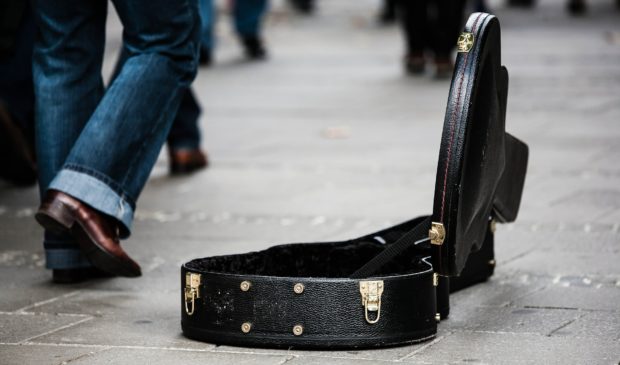City busking program brings public music performance into question
Wednesday, February 7, 2018 by
Chad Swiatecki Austin’s long-debated policy concerning the legality of paid acoustic street performance – widely referred to as “busking” – returned as an issue of some discussion Monday, with the city’s music office attempting to change both the perception and enforcement of the practice.
Busking is an issue that has long bedeviled music proponents in Austin because musicians soliciting donations for their performances can technically be cited for violating the city’s anti-panhandling ordinance as a way to run them off from businesses or residences who complain.
With the music office preparing for the March 10 launch of what’s being billed as a multi-year busking program at the Green Water Development on Second Street, the legal question marks surrounding the practice surfaced again at Monday’s meeting of the Austin Music Commission. The program will use $150,000 given to the city by developer Trammell Crow Company for public arts and music funding to fund a series of curated, unamplified performances by Austin musicians, who will earn $150 per hour each as part of the concert series.
Monday’s debate centered on whether the concert series that mimics the dynamics of spontaneous street performance will confuse the issue concerning the legality of unamplified public performance for compensation.
Erica Shamaly, manager of the city’s Music and Entertainment Division, said her office will use the series to set expectations for busking to gradually expand around the city.
“We want to create a culture of street performance in Austin, and so this pilot program is a way to roll it out in a way that makes sense for Austin,” Shamaly said.
“We’re going to convene all relevant city departments in the same room so everyone has clear expectations of what street performance means in Austin and what’s acceptable and isn’t acceptable. Hopefully with the issues we ran into two or three years ago, we’re going to get everyone around the table to talk through the issues and get into the difference between panhandling and street performance.”
As recently as 2015 the Music Commission heard public comments from musicians who complained that Austin’s policy invited harassment upon street performers even though many other large U.S. cities allow and even encourage busking.
In 2014, the commission asked City Council to amend portions of the city ordinance outlining prohibited activities to allow busking in portions of downtown cited as entertainment districts. A resolution that would have added music-related exceptions to the anti-panhandling ordinance in those districts was on the Council agenda in December 2014 but was pulled prior to the meeting and never revisited.
With no official action since then despite multiple inquiries by Music Commission members to the city legal department, some interpret the existing city policy as being anti-busking, though there is also question about how stringently the matter is enforced.
“I’d hate to see it happen where you’d have to have this paid gig status to actually busk,” Commissioner Rick Carney said.
“I know there is some ambiguity in city law around this. During South by (Southwest) there’s going to be hundreds, if not thousands of people doing that all over downtown. To me what makes more sense is calling this a music in public places program, and I’d rather keep busking separate from it.”
Commissioner Paul Pinon said he also has some concern that the city’s program could lead to more aggressive policing of unamplified public music around the city. And Commissioner Revlynn Lawson brought up the potential of upstart street performers looking to piggyback on the crowds that are expected to attend the weekly performances in public.
“In these curated spots, what’s to stop someone else from setting up two feet away?” she asked. “Part of the concern is that I’ve been in cities where there’s a musician performing every two feet, and that’s when it gets loud and … messy.”
This story has been corrected. We originally reported the pilot program would be six months long, but it will be multi-year.
The Austin Monitor’s work is made possible by donations from the community. Though our reporting covers donors from time to time, we are careful to keep business and editorial efforts separate while maintaining transparency. A complete list of donors is available here, and our code of ethics is explained here.
You're a community leader
And we’re honored you look to us for serious, in-depth news. You know a strong community needs local and dedicated watchdog reporting. We’re here for you and that won’t change. Now will you take the powerful next step and support our nonprofit news organization?









